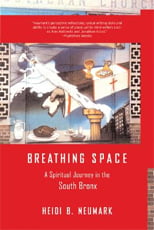Does calling to a particular congregation automatically mean you are required to give your whole life to a particular group of people?
 Recently, I finished a wonderful pastoral memoir called Breathing Space: A Spiritual Journey in South Bronx by Heidi Neumark. Heidi is a Lutheran pastor who writes about her 20ish year journey with a congregation in transformation in a neighborhood also in transition. Pastor Heidi lived in the neighborhood where she worked and full enmeshed herself and her family (husband and two children)-- worshipping, playing, and shopping in the blocks surrounding her church.
Recently, I finished a wonderful pastoral memoir called Breathing Space: A Spiritual Journey in South Bronx by Heidi Neumark. Heidi is a Lutheran pastor who writes about her 20ish year journey with a congregation in transformation in a neighborhood also in transition. Pastor Heidi lived in the neighborhood where she worked and full enmeshed herself and her family (husband and two children)-- worshipping, playing, and shopping in the blocks surrounding her church.
The journey Pastor Heidi described I found much kinship in, even though our settings are quite different. She arrived at a congregation without the physical, emotional or spiritual infrastructure for long-term survival. She was greeted, nurtured and sustained in her early years there by some amazingly faithful saints of God who inspired her to fully commit herself to the work at hand. She saw in her diverse faith community great potential.
While it was a beautiful journey to read about, I begged to ask myself the question on countless occasions while reading it, how in the world was this pace of life sustainable? And, it seemed that Pastor Heidi asks herself this question over and over again too; thus, the title of the book, breathing space.
Yet, there were points in the book where my heart stirred for her because it seemed that she was so close to finding the answers but just kept on working "for God."
Consider this, Heidi Neumark writes:
We had a German student, Bend, staying here and visiting the church for two months. At the beginning, he asked me about friendships in the parish and how it worked to maintain friendships in other places. I said that it was hard to do because most of our friends now lived at some distance, but that it didn't bother me at all. My work and my family were more than enough. When I said it, I believed it was true. But I remembered exactly what I was doing when he asked the question. I was standing at the sink washing pesto of the dinner plates. I remember the Brillo pad in my hands, the pieces of green pasta and bits of garlic stuck to the plates, the running water. I washed dishes countless time since then, but I can't remember one. I was fooling myself when I thought it was an easy question.
It is true that my work and my family fill my heart and occupy my days. . . . It was easy to become Bernd's friend because it was convenient. He was right there. When he left, I had to ask myself-- am I sad because Bernd is leaving or because another friend is moving out of reach? It was both. But friendship is not always, or at least in my circumstances, not usually convenient. (90-91).
Of course, friendship is not always convenient. It really isn't, and usually the things that are most life-giving to our souls aren't.
One of the biggest sins, I think, of those serving in pastoral ministry is regularly doing what is right in front of us. Someone need to go to coffee? I'm there. Someone in the hospital for the fifth time this month? Sure, I'll visit them again. Need someone to serve on this denominational board? Sure, I can go to those extra meetings. We just aren't good at saying, "No" or "Later."
I believe such practices are where we as pastors hide, under the banner of "the busyness of ministry." To this, I say, ministry is only as busy as we make it. Of course there are unexpected funerals. Of course there are unexpected building issues. Of course there is someone who needs to talk on a day when such is not scheduled. But, when we look at our calendars, as ministry leaders, are we intentionally making time for things that matter to us?
Are we finding breathing space through relationships outside of the church?
Are we talking time each week to remember we are always more than our jobs?
Are we finding more out about the people God has made us to be so that upon retirement we aren't just starring at the walls wondering who we are without the church to tell us?
The longer I read Pastor Heidi's memoir, the longer, I wished for her a long retreat with some of the dear friends that she mentions moving away. I wished for her a longer time a part each year from her church so to get an even great respect for its context. I wished for her peace, so not to feel as if she was carrying this burden of a church in transition alone.
Breathing space after all, I don't think just comes to us. We have to grow a place in our souls and calendars for it to live. And, how beautiful such space can truly be!